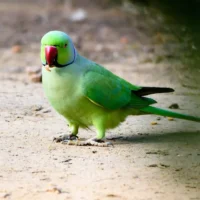January is Adopt A Rescued Bird Month! As advocates for animal welfare, we applaud those who choose to give rescued animals a loving home. We believe all animals should be treated with love and compassion! However, it is crucial to educate oneself before making the decision to adopt any animal. This is especially true with birds. Our feathered companions have specific needs, so you’ll need to do some research and preparation before taking the plunge. You can find some helpful tips on adopting a rescued bird in this article by a local Ellicott City, MD vet.
What Are The Benefits Of Adopting A Rescued Bird?
There are many reasons to give Polly a loving forever home. Birds are super fun and cute. They are full of personality, and can brighten up any household. These guys don’t take up much space in our homes, but they can definitely take over a huge chunk of our hearts.
The fact that we can give a second chance to a scared, sweet pet is also wonderful. It really does feel great to help an animal in need! You’ll also be setting a great example for others and making room for another rescue bird in the shelter or foster home.
How Do I Prepare For A Rescued Bird?
We recommend having the cage set up before you bring Polly home.
There are a few things to consider when choosing a cage. Remember that the type and size will vary depending on the type of bird you have. We recommend getting the largest one possible that will still fit within your available space. To avoid any issues when shopping, measure the designated location beforehand. This will give you an idea of how much space you have to work with. Although purchasing a used cage might seem like a good idea, be cautious: if the cage’s previous inhabitant was sick, it may pose a health risk.
Be sure to add lots of toys and perches! Ask your Ellicott City, MD avian veterinarian for more information.
What Can You Do To Help A Rescued Bird Adjust To Its New Home?
Once you bring Polly home, it is best to initially keep her in her cage for a few days. While it is important for birds to have some free time, right now your main goal is for her to feel comfortable and settled. Talk to her and hang out near her, but don’t force things.
What Is The Best Way To Bond With A Rescued Bird?
It is important to keep in mind that birds can be quite timid. This is especially important when it comes to rescues, as our feathered friends tend to get very attached to their humans. Polly may be depressed due to being separated from her former master, and may need time to adjust.
Your pet’s personality also comes into play here. Some of our feathered friends are very bubbly and charismatic, and may sing, dance, and play with you. Others are more timid and wary, and will need more time to warm up.
You can warm your winged pal’s heart by following these tips:
- Put a comfy chair near Polly’s cage. Hang out there when you want to read, scroll on your phone, or watch TV. Your new pet will get used to you if you spend time near her cage.
- Use a quiet, gentle, and friendly tone of voice when speaking to Polly. She may not understand what you’re saying, but she will pick up on the tone of your voice.
- Take care not to scare your pet. It’s understandable that you want to pet or cuddle your new bird, but let her feel safe before you try to handle her. Don’t try to grab or stick your hands into the cage. Always move very slowly around your new friend, and offer treats and toys.
- Treats are great for bonding. You can offer various fruits and vegetables that are bird-safe, millet spray, treat sticks, or raw pasta. It may take some time to figure out what Polly likes best. Just be sure to only offer safe snacks. Consult your veterinarian for specific advice.
Polly will need time to learn to trust you. Don’t force things. Birds become extremely attached to their owners, but that bond doesn’t form overnight. Love takes time!
What Should I Look For When Choosing A Rescue Bird?
We recommend doing lots of research, and looking at different breeds to figure out what is right for you. Birds’ volume, cage requirements, size, and life expectancy can vary quite a bit from breed to breed. For beginners, you may want to choose a bird that is easy to keep, like the Cockatiel, Budgie, Parrotlet, Lovebirds, Canary, Pionus Parrot, or Amazon Parrot.
Here are a few things to consider:
- Speech Capacity
- Size
- Life Expectancy
- Trainability
- Intelligence
- Volume
- Social needs
Research is key. Some types of birds do well in apartments, while others need a lot more space. Some are very quiet, while others are extremely noisy.
Of course, breed is only one factor. Birds all have their own personalities. While it’s important to make a connection, it’s also important to make a good match. Observe your potential pet before deciding. Check out Polly’s medical history and check out how she interacts with you and others. You should also get a look at her health status.
We’d also recommend finding out whatever you can about Polly’s history. Birds are one of the most commonly rehomed pets. This is quite sad, as changing owners can be traumatic for them.
If you can, find out why your feathered pal is up for adoption. Sometimes birds are rehomed because they’re loud. Sometimes it’s because of behavioral issues. That’s sad, because these are often the result of improper care. A lack of understanding is a big part of the problem here. Many people adopt birds without realizing the amount of care and attention they require. That said, new bird owners may find it hard to take care of a bird that is extremely difficult and/or recovering from abuse or trauma.
Things To Consider Before Adopting A Rescue Bird
Despite the fact that birds have wonderful qualities, they aren’t the right pet for everyone. Make sure you look before you leap. Polly can be a messy roommate. As she has sensitive lungs, she shouldn’t be in a household with tobacco smoke, chemicals, or vapors. You’ll need to consider other pets as well. You’ll need to do a lot more ‘catculations’ if you have a kitty than your would if Polly were to be the only pet in the house.
What Can I Do To Make My Home A Safe Place For A Rescued Bird?
A lot of common household items are harmful to birds. Petproofing is a must. Some potential dangers include fans, window treatments, candles, mirrors, and fireplaces, just to name a few. Small or sharp objects are also a concern, as are items like kitchen utensils, full sinks and toilets, and plastic objects. Air quality is also key. Polly has very sensitive lungs, and can get sick breathing things that are fine for us. Your Ellicott City, MD veterinarian can provide specific advice on how to protect your feathered friend from fumes.
If you have questions about caring for a rescued bird, contact us, your Ellicott City, MD local pet hospital!





